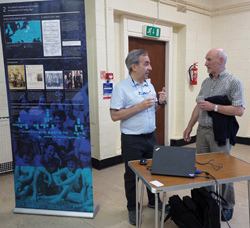As part of the bicentenary of the Scottish Jewish Community, SCoJeC has arranged two series of talks by historical researchers in the towns that once hosted small Jewish communities. The first speaker was Michael Tobias, an award-winning genealogist who has spent many years exploring the history of Scottish Jewish communities, who spoke in Dunfermline, Falkirk, and Ayr. The talks were also part of Refugee Festival Scotland 2017, and Michael brought to life the story of how Scotland welcomed Jewish refugees during the last 200 years and how the present Jewish communities in Scotland are linked to Jewish communities of the past.
Of particular interest was the venue in Ayr – Rozelle House, which now hosts the beautiful MacLaurin Art Gallery. This is itself a place with Jewish connections, as it was once a place of refuge for wartime refugees. Susanne Schaeffer and Lore Zimmerman came to Scotland on the Kindertransport and were fostered by the Hamilton family who owned the house at the time and gifted it to the town in 1968.
 |
Michael began his talks by discussing the source materials available. After the French Revolution, the first Aliens Act of 1793 required refugees arriving at British ports to register with the authorities, because then, as now, there were worries that spies could be posing as refugees. Before 1841, there was no official register of marriages in Scotland, but the date and place of the parents' marriage was shown on birth certificates, and these show that most Jewish people came to Scotland from Lithuania and Poland, with others from Odessa, Belgium, Germany, Italy, Georgia and elsewhere. He went on to talk about patterns of migration across Scotland, with particular reference to the rise and decline of the community in the area where he was speaking.
The talks were well-attended by people aged from 15 to 85 with Jewish connections and others interested in local history, and there were lots of interesting questions after each talk. One audience member in Dunfermline, a retired genealogist, asked how surnames had changed, and Michael responded that Jews did not have surnames before the 1820s; after that they often took their fathers' first names as a family name. His own name Tobias is an example, taken by one of his ancestors.
Replying to a question about how these Jewish immigrants were received in Scotland, Michael said he had no evidence that there had been antisemitism directed against those early immigrants.
Another questioner wanted his view on the claim that the Scottish people might be one of the lost tribes of Israel, but Michael had to disappoint him, as DNA tests show Jews and Scots have no genetic connection.
One audience member in Falkirk, said, "the talk was excellent and well illustrated, showing movement of Jews through the decades. I hadn't realised so many used Scotland as a stepping stone to the US."
A resident of Ayr told us: "I loved to hear about the Ayr Jewish community and was able to add missing facts about the area, synagogue, and community as Michael spoke. It was a lovely friendly event, thank you!"
And in Dunfermline one of the audience commented: "Talk was brilliant. Michael has an excellent reputation and his knowledge during the talk was amazing. He was also very patient with questions afterwards. Buffet was kind of you."
Michael said: "I really enjoyed visiting the three communities that I knew little about beforehand. The questions were interesting and it was particularly interesting to find family connections in all three towns."
Joanne Gabbay, SCoJeC's Events Coordinator who chaired the events, had a hard time bringing the discussions to an end because the questions just kept coming. She commented, "Listening to Michael has started some lovely conversations in my family about our origins."
We are grateful to the Netherlee and Clarkston Charitable Trust for supporting these activities.